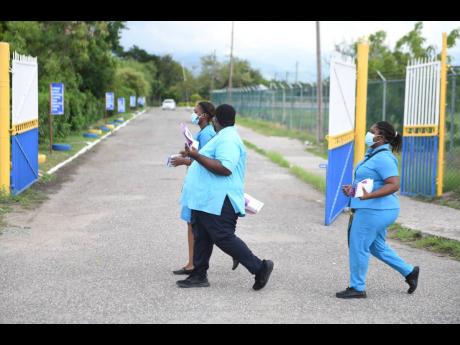IDB survey: One in two households have lost jobs in Jamaica
About half of households surveyed in Jamaica have registered a job loss since the pandemic, according to findings of an Inter-American Development Bank, IDB, survey.
Contrastingly, upper-income households registered job losses at half the rate, or 25 per cent.
“The responses from the survey for Jamaica were sobering. Nearly 60 per cent of low-income households (earning less than the minimum wage) reported a job loss in the household, and even a quarter of higher-income families reported a job loss as well,” stated the report.
Official data from the Statistical Institute of Jamaica to January puts the unemployment rate at 7.3 per cent. But with tens of thousands of jobs lost in the tourism sector alone – initial estimates of lay-offs were about 100,000 across the labour force, half of which were linked to the hospitality sector – the unemployment numbers are expected to descend into double-digit levels under the pandemic, the local onset of which began on March 10.
The IDB conducted its jobs survey online during the second half of April. The findings were published in its latest quarterly report entitled The Pandemic - The Saga Continues. The online survey was meant to gauge the extent of the social impact during the height of the lockdown, the bank added, and does not meet the statistical standards of a full household survey.
To add to the loss of income up to April, there was a reported decline in remittances for over half of low-income families and nearly half of families in other income categories. Since that time, remittances have recovered somewhat, according to Bank of Jamaica data showing gains as of June.
In relation to the middle class, the IDB said that 48 per cent of those households experienced a job loss. Additionally, 50 per cent of the middle class experienced business closures. This represented the highest level among the three income categories. Upper-income persons witnessed a closure of businesses in 32 per cent of cases while for low-income households, closures were estimated at 45 per cent.
The report classified those earning less than US$5 a day as vulnerable and within the low-income group while earnings above US$62 a day were designated ‘high class’.
In terms of reduction in rental income, the upper-income households registered the greatest decline, with 20 per cent of households affected, compared to 12 per cent for middle-income households and 9.0 per cent for low-income households.
The IDB, a multilateral funding agency, said that COVID-19 implies that Jamaica will experience a significant decline, particularly given its dependence on tourism. The sector’s total contribution to employment and output stands at about 30 per cent, added the report, and tourism receipts are the equivalent of about 50 per cent of all export revenues.
“Jamaica is one of the most tourism-dependent economies in the world, relying crucially on the sector for export receipts, employment, and output,” the IDB said.
It noted that restrictions on travel, including top source markets for tourists such as United States, Canada, and Europe continue to stifle the industry.
“Similarly, both the attitudes of would-be travellers and the impacts of the crisis on disposable incomes may continue to create hurdles for the sector over the coming months and into next year,” the development bank said.
Jamaica reopened its borders in June, but tourism numbers are still below break-even levels for most hotels.
The Jamaican economy is projected to contract by around 10 per cent this year, largely driven by the fallout in the travel and hospitality market.
The IDB survey was done in multiple Caribbean jurisdictions by its respective teams. There were 12,500 respondents, overall.

